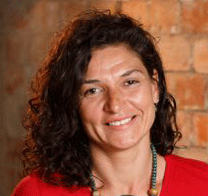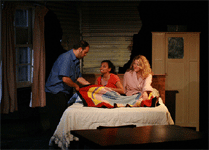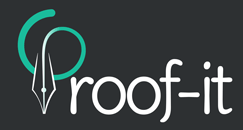Kamarra Bell-Wykes – October 13 2019
International Year of Indigenous Languages – 2019
 Kamarra (aka Kymarra) is an award-winning playwright and performer. She is a descendant of the South-East Queensland Jagera and Daling-bara people. Kamarra received the prestigious Greenroom Gerda Nicholson Emerging Actress Award in 2003 for her role of Ann in Stolen and her award-winning health-education shows include Chopped Liver, Body Armour and North West of Nowhere, commissioned specifically for prison and school audiences to educate around issues such as intravenous drug use, body modification and Hepatitis C. Kamarra’s other plays include Shrunken Iris and Crying Shame. She participated in the Black Comedy creative development process for ABC2. Kamarra holds a Bachelor of Teaching and Learning and is currently Creative Director at Ilbijerri Theatre Company, where she is developing a First Nations approach to directing, devising and dramaturgy.
Kamarra (aka Kymarra) is an award-winning playwright and performer. She is a descendant of the South-East Queensland Jagera and Daling-bara people. Kamarra received the prestigious Greenroom Gerda Nicholson Emerging Actress Award in 2003 for her role of Ann in Stolen and her award-winning health-education shows include Chopped Liver, Body Armour and North West of Nowhere, commissioned specifically for prison and school audiences to educate around issues such as intravenous drug use, body modification and Hepatitis C. Kamarra’s other plays include Shrunken Iris and Crying Shame. She participated in the Black Comedy creative development process for ABC2. Kamarra holds a Bachelor of Teaching and Learning and is currently Creative Director at Ilbijerri Theatre Company, where she is developing a First Nations approach to directing, devising and dramaturgy.

Photo: Jess Tran
Mother’s Tongue
Australian Script Centre, 2018
60 minutes; 2 female, 1 male
Cast age: 16 to 18, 18+; Audience age: young adult, adult
Mother’s Tongue is a contemporary Indigenous story about David and Ngala, a brother and sister trying to find their way in life after the death of their grandmother, the keeper of secrets and last custodian of the knowledge of a whole language group. After her death, David is the only person left alive that can speak his mother’s tongue although the scars of transgenerational trauma leave him culturally mute. His sister’s determination to unlock his silence is almost their demise as the beautiful but toxic Jolene enters their fractured world, representing all that is Western appropriation.
Body Amour
Australian Script Centre, 2018
45 minutes; 2 female, 1 male
Cast age: 16 to 18, 18+ Audience age: teen, young adult, adult
Meet Dannii, Harley and Rose. Three teenagers. Three individuals. Three modern-day warriors on a quest for identity; fuelled with attitude and armed with ink and steel. When their paths cross unexpectedly, they realise that they might have found more than they were looking for. And that sometimes, the best way to look forward is by looking back ….
